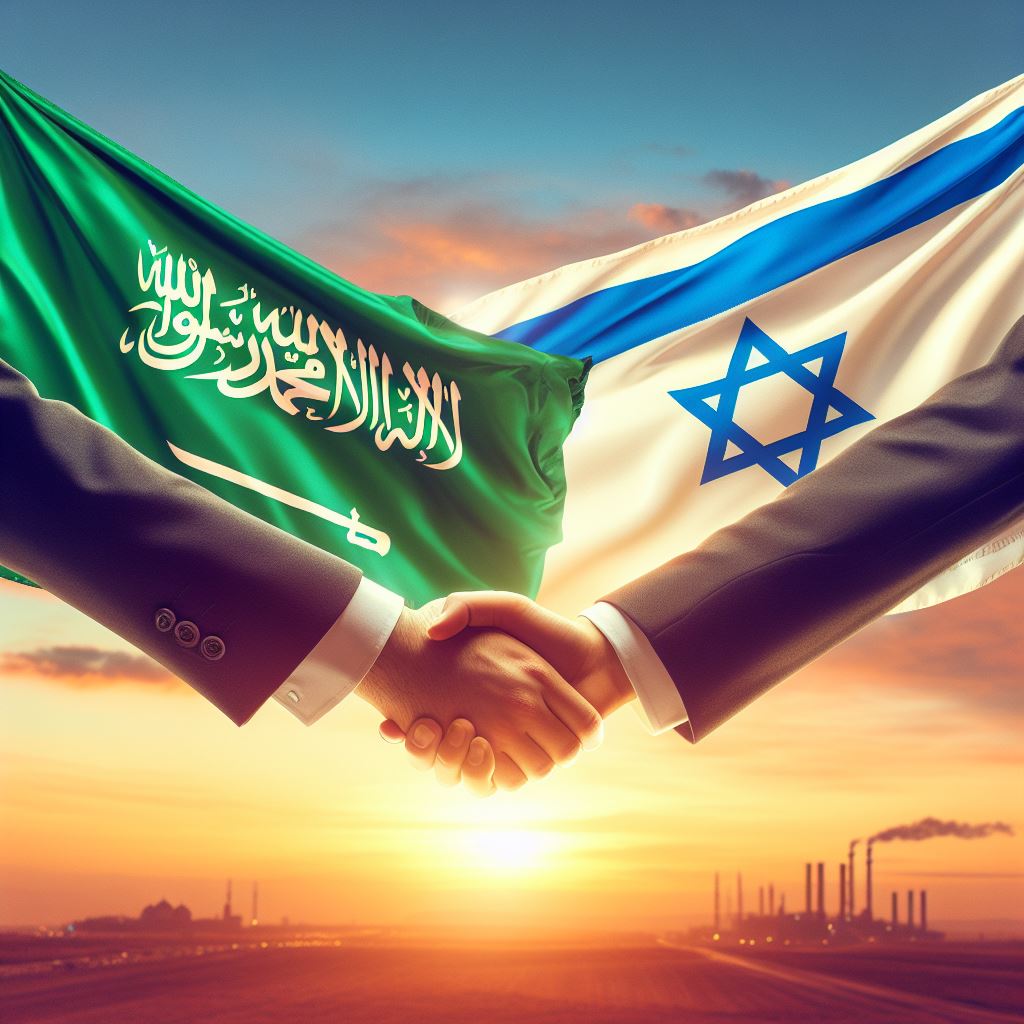Israel and Saudi Arabia – A fragile dance of regional hegemonies
On 20 September 2023, Crown Prince Mohammed bin Salman (MBS) commented on exploratory talks regarding an agreement between Saudi Arabia and Israel: “Every day we get closer”. One day later, Israel’s Foreign Minister Eli Cohen predicted that an agreement would be reached in the first quarter of 2024. In the meantime, Israel is waging a war against Hamas in the Gaza Strip and the rapprochement seems to have receded into the distant future.
The article takes a look at the historical point of the relationship between Israel and Saudi Arabia, what core interests the two states are pursuing and how we can view ahead to the year 2024.
At what point do we find ourselves?
After decades of distancing by the Arab League, Egypt (1979) and Jordan (1994) were the first to normalize their relations with Israel. The Arab League had spoken out against recognition after Israels’s proclamation of independence, and 15 of 22 member states have no diplomatic ties with Israel to this day. In 2020, however, Sudan, Morocco, Bahrain and the United Arab Emirates (UAE) signed a bilateral agreement with Israel, which led to a normalization of relations and thus recognition.
As part of the US-brokered Abraham Accord, Morocco received US support in recognizing Western Sahara as Moroccan territory in exchange for recognition of Israel, and the UAE was assured of the delivery of F-35 fighter jets. Sudan was removed from the list of “State Sponsors of Terrorism” in exchange for recognition. The agreement was also reflected in tourism. In 2022, 200,000 Israeli tourists visited Morocco and 268,000 tourists visited the UAE.
The opportunity for such an agreement could not be allowed to pass Saudi Arabia by. Under MBS in particular, the largest state in the Arabian Peninsula is attempting to pursue a liberal and modern foreign policy with its proclaimed “Vision 2030”, which allows it to move closer to Israel. In 2020, Saudi Arabia opened its airspace for civilian use by Israeli aircraft, which greatly shortened flight routes to Southeast Asia. Israel’s Minister of Tourism, Haim Katz, was the first Israeli minister to officially visit Saudi Arabia on 26 September 2023, followed by the Minister of Communications on 1 October, when he attended a conference in Riyadh. Both countries had already been exchanging intelligence on Iran for years. However, Saudi Arabia has also intercepted missiles fired from Yemen towards Israel during the current war in the Gaza Strip.
So what interests are the two states pursuing?
Who is pursuing which interests?
Israel: Israel has the strongest interest in the symbolic and de facto recognition of its state by the guardian of Islam’s most important sanctuary. Recognition of Israel by Saudi Arabia would weaken those narratives that religiously legitimize terrorism against Israel. It would also open the door to other Islamic states, such as Malaysia and Indonesia, which would be particularly interesting as sales markets. At the same time, with Saudi Arabia, Israel would gain access to a market with 20 million buyers (after the agreement with the UAE, the volume of trade between the two states doubled). Another security interest is the formation of a political front against Iran.
Saudi Arabia: Saudi Arabia’s interests vis-à-vis Israel are clearly of a security policy nature. An agreement would include a concession by the USA to supply modern weapons systems, as well as security guarantees on a military level. Saudi Arabia’s greatest regional threat is the common enemy Iran, which supports Shiite Houthi rebels in Yemen as well as Hezbollah in Lebanon and Hamas in Palestine. Saudi Arabia also has an interest in building up a civilian nuclear programme with the help of the USA, which could be used to manufacture nuclear weapons. Saudi Arabia is therefore attempting one thing above all: to take a leading role against Iran through military armament, and at the same time to assert its leading role in the Middle East against other Arab states. Saudi Arabia hopes that Israel will give it access to a well-developed IT sector.
How likely is an agreement between Israel and Saudi Arabia?
If an agreement were to be reached, this would promote the peace process in the Middle East and increase general prosperity in the region.
However, Hamas’ attack on Israel in October 2023 has brought a halt to rapprochement between the two states. Saudi Arabia, as a declared supporter of Palestinian independence efforts, will not attempt any rapprochement with Israel as long as there is a war in the Gaza Strip. Due to its rivalry with Iran, however, it can be predicted that Saudi Arabia’s security and economic interests will take precedence over solidarity with a Palestinian state if Israel is unwilling to abandon its settlement policy. This is particularly true because Hamas is also a thorn in Saudi Arabia’s side due to its ties to Iran and its historical links with the Muslim Brotherhood. The state will therefore continue to strive to normalize its relations with Israel even after the end of the current war. However, as presidential elections will also be held in the USA in 2024, there is no guarantee that a possible new administration will be willing to make the same concessions to Saudi Arabia as it has done so far. The same applies to Netanyahu’s government. Should the trials for corruption and abuse of power end in a guilty verdict, Israeli politics would be preoccupied with itself in the short and medium term. The situation therefore remains highly unstable. Translated with www.DeepL.com/Translator (free version)

